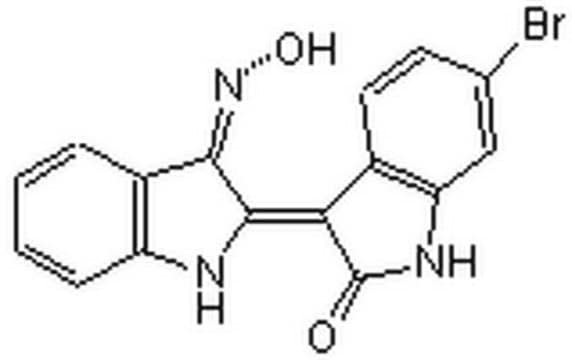361571
CHIR99021
≥95% (HPLC), liquid, GSK-3 inhibitor, Calbiochem
Synonym(s):
InSolution GSK-3 Inhibitor XVI, CHIR99021, 6-(2-(4-(2,4-Dichlorophenyl)-5-(4-methyl-1H-imidazol-2-yl)-pyrimidin-2-ylamino)ethyl-amino)-nicotinonitrile
About This Item
Recommended Products
product name
GSK-3 Inhibitor XVI, CHIR99021, InSolution, ≥95%, 25 mM
Quality Level
Assay
≥95% (HPLC)
form
liquid
manufacturer/tradename
Calbiochem®
storage condition
OK to freeze
avoid repeated freeze/thaw cycles
desiccated (hygroscopic)
protect from light
shipped in
ambient
storage temp.
−70°C
InChI
1S/C22H18Cl2N8/c1-13-10-29-21(31-13)17-12-30-22(32-20(17)16-4-3-15(23)8-18(16)24)27-7-6-26-19-5-2-14(9-25)11-28-19/h2-5,8,10-12H,6-7H2,1H3,(H,26,28)(H,29,31)(H,27,30,32)
InChI key
AQGNHMOJWBZFQQ-UHFFFAOYSA-N
General description
Biochem/physiol Actions
GSK-3 α and β
Packaging
Warning
Physical form
Other Notes
Ring, D.B., et al. 2003. Diabetes52, 588.
Bennett, C.N., et al. 2002. J. Biol. Chem.277, 30998.
Cline, G.W., et al. 2002.
Diabetes51, 2903.
Legal Information
Storage Class Code
10 - Combustible liquids
WGK
WGK 2
Flash Point(F)
188.6 °F - closed cup - (refers to pure substance)
Flash Point(C)
87 °C - closed cup - (refers to pure substance)
Certificates of Analysis (COA)
Search for Certificates of Analysis (COA) by entering the products Lot/Batch Number. Lot and Batch Numbers can be found on a product’s label following the words ‘Lot’ or ‘Batch’.
Already Own This Product?
Find documentation for the products that you have recently purchased in the Document Library.
Customers Also Viewed
Our team of scientists has experience in all areas of research including Life Science, Material Science, Chemical Synthesis, Chromatography, Analytical and many others.
Contact Technical Service










